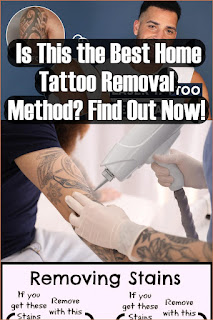Is This the Best Home Tattoo Removal Method? Find Out Now!
The allure of tattoos is undeniable. However, the permanence of this form of self-expression can become a source of regret for many. Life circumstances change, personal tastes evolve, and what once felt like a perfect choice can later feel like a regrettable decision. This shift in perspective frequently leads individuals to seek tattoo removal, a process that was once daunting and expensive but is now increasingly accessible, albeit with varying degrees of efficacy and safety. The question that frequently arises, especially in the age of readily available information and at-home remedies, is whether a truly effective and safe home tattoo removal method exists.
The Allure and Regret of Tattoos
Tattoos have risen from the fringes of society to become a mainstream form of artistic self-expression. The proliferation of tattoo parlors, skilled artists, and diverse stylistic approaches has significantly contributed to their popularity. For many, a tattoo signifies a significant life event, a personal belief, or a tribute to a loved one. The process itself can be a powerful experience, forging a connection between the individual and the artist, and the resulting artwork becomes a tangible representation of their inner world.
However, the permanence of a tattoo is precisely what can become its downfall. Factors such as poor artistry, impulsive decisions, relationship changes, or evolving personal values can lead to tattoo regret. This regret, which can range from mild discomfort to profound dissatisfaction, motivates individuals to seek methods for removing or altering their tattoos. While professional removal methods exist, their cost and commitment can be significant barriers. This often leads individuals to explore home remedies, leading to the central question of this article: is there a truly effective and safe home tattoo removal method?
Understanding Professional Tattoo Removal Methods
Before delving into the realm of home remedies, it is crucial to understand the established, clinically proven methods of tattoo removal. These methods are primarily based on laser technology.
Laser Tattoo Removal
Laser tattoo removal is considered the gold standard in the field. This procedure uses a high-powered laser to target the ink pigments within the skin. The laser's energy breaks down the ink particles into smaller fragments that can be gradually absorbed and eliminated by the body's immune system. The effectiveness of laser removal depends on several factors, including:
- The type of ink used (some inks are more resistant to laser treatment)
- The depth of the ink in the skin
- The color of the ink (darker colors are generally easier to remove)
- The individual's skin type and healing capacity
- The skill and experience of the laser technician
Laser tattoo removal is not a one-time procedure. Multiple sessions, typically spaced several weeks apart, are usually required to achieve satisfactory results. While effective, this method can be expensive and may cause temporary side effects such as redness, swelling, and blistering.
Surgical Excision
In cases of smaller tattoos, surgical excision can be an option. This involves surgically removing the tattooed skin and then closing the wound with stitches. This method is less common due to the potential for scarring and its suitability only for small tattoos.
The Claims of Home Tattoo Removal Methods
The internet is rife with claims of home remedies for tattoo removal. These range from topical creams and ointments to natural ingredients and specialized devices. However, it's crucial to approach such claims with a high degree of skepticism.
Many advertised home remedies lack scientific evidence to support their effectiveness. While some ingredients may temporarily lighten the appearance of a tattoo, they are unlikely to completely remove the ink. Furthermore, the use of unproven methods can carry significant risks, including:
- Skin irritation and allergic reactions: Many home remedies contain ingredients that can cause adverse reactions in sensitive skin.
- Scarring: Improper techniques can lead to permanent scarring.
- Infection: Open wounds resulting from attempts at home removal are susceptible to infection.
- Hypopigmentation or hyperpigmentation: The skin may lose or gain pigment in the treated area, resulting in discoloration.
Commonly touted home remedies often involve abrasive exfoliation, the application of potentially harmful chemicals, or the use of dermabrasion devices, all of which significantly increase the risk of complications. There is no scientifically validated home method that effectively and safely removes tattoos.
The Verdict: Is There a Best Home Method?
The simple answer is no. There is no safe and effective home method for complete tattoo removal. While some home remedies may provide temporary lightening or fading, they will not achieve the results of professional laser removal. The risks associated with attempting home tattoo removal significantly outweigh any potential benefits.
Choosing a professional, qualified dermatologist or plastic surgeon for laser removal is the safest and most effective approach. While the cost may be a factor, the potential for long-term complications from attempting home removal makes professional treatment the far better choice. Before considering any tattoo removal method, thorough research and consultation with a healthcare professional are essential to ensure both safety and efficacy.
Ultimately, the decision to remove a tattoo is a personal one. However, informed decision-making is crucial. While the desire for a quick and inexpensive solution is understandable, the pursuit of such solutions through unproven home methods can lead to irreversible damage and significant health risks. Always prioritize safety and seek professional guidance before undertaking any tattoo removal process.
